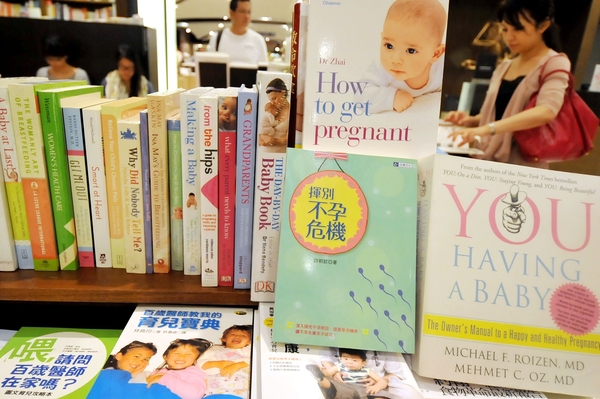 A variety of books on pregnancy and infertility are on display in a
bookstore in Taipei on June 6, 2013. Three years ago Mr and Ms Lee
fulfilled their dreams of parenthood with the help of a Thai surrogate
mother. Like many Taiwanese couples in their situation, they were forced
to seek surrogacy abroad because the procedure is illegal at home in
Taiwan. (AFP photo)
A variety of books on pregnancy and infertility are on display in a
bookstore in Taipei on June 6, 2013. Three years ago Mr and Ms Lee
fulfilled their dreams of parenthood with the help of a Thai surrogate
mother. Like many Taiwanese couples in their situation, they were forced
to seek surrogacy abroad because the procedure is illegal at home in
Taiwan. (AFP photo)``Healthy couples cannot imagine the difficulty and pain we have been through. We tried everything we could,'' said Mr Lee, a 40-year-old businessman in Taipei who did not wish to give his full name.
He and his 35-year-old wife also considered adoption. ``But since there was still a way we could have our own child, surrogacy was the best option,'' he said.
``We envied other couples who have children and we finally felt that our lives were complete when our son was born,'' he said.
The Lees say they hired their surrogate mother in Thailand on mutually agreed terms.
``We didn't force her to become a surrogate mother, she wanted to make money out of her own free will. I don't think it demeans her in any way,'' Mr Lee said.
A bill to legalise altruistic surrogacy - in which a woman agrees to carry a child for another couple through In vitro fertilisation without financially profiting from the procedure - remains in limbo in Taiwan, forcing couples like the Lees into the global commercial surrogacy market.
The island is divided over the controversial and sensitive issue, which presents a legal and ethical minefield for experts who have failed to agree on issues such as the rights of the surrogate mother, biological parents and the foetus.
Those who broker or make financial gains from embryo reproduction face a possible two-year jail term, although there is no penalty for those who pay for it, according to prosecutors.
The legality of surrogacy varies widely around the world, particularly in Asia where commercial for-profit surrogacy services are prohibited in many countries.
India is an exception, where the government is in the process of passing laws to regulate a fertility industry that offers foreign couples cheaper alternatives to options such as the US and Britain.
Altruistic surrogacy options are legally available in Australia subject to strict screening processes. China prohibits surrogacy, while Japan, South Korea and Thailand have no laws in place determining the rights of participants.
Taiwan's health authorities first contemplated legalising surrogacy about a decade ago and drafted a bill in 2005 but there has been no real progress since then.
``In light of the demand for reproductive technology as well as some ethical concerns from society, the bureau has been actively promoting discussions at home and following international experiences in order to come up with a bill that is thorough while meeting the demands of our time,'' said Taiwan's Bureau of Health Promotion in a statement.
Opposition comes from women's rights groups, who say surrogacy satisfies the needs of wealthy couples but overlooks the health risks and emotional impact on surrogate mothers during and after the pregnancy.
A surrogacy procedure can cost around US$55,000 (170,500 baht) in Thailand to $100,000 in the United States, including medical and legal expenses as well as payments to surrogate mothers, according to fertility experts.
``A woman's body is not a commodity or a tool. We oppose rich people exploiting poor women and buying them as surrogate mothers,'' said Huang Sue-ying, chairperson of the advocacy group Taiwan Women's Link.
She urges Taiwanese couples to reconsider the traditional concept of producing an heir and ``open up their minds'' to other possibilities such as adopting orphans.
``Traditionally a couple would need to have a son to continue the family line but what if a surrogate mother doesn't bear a son? I don't think technology can resolve a cultural issue,'' she said.
Demand for infertility treatment has been on the rise in Taiwan, which has one of the world's lowest birth rates, partly as more couples choose to get married and have babies at an older age, doctors say.
In 2012, the average age of women who gave birth for the first time was 30.1 years old, according to the interior ministry.
Estimates of the number of Taiwanese couples seeking surrogacy range from anywhere between several hundred to tens of thousands.
Dr Liu Ji-ong, a fertility expert in Taipei, said surrogacy is the only option for many women with underlying medical conditions.
``I think it is a question of social justice. We cannot neglect the needs of those women who want to be mothers as they are unlikely to speak up for themselves or take to the streets,'' he said.
Mr Lee said he only hopes that if the surrogacy bill is passed, it recognises previous cases. Currently he can only register his son as his child born out of wedlock, while his wife is recognised as the ``adoptive mother''.
However, he said he doubts that Taiwan will see real progress on the issue in the short term.
``It is not a major concern for Taiwanese politicians because there are just not enough votes for them,'' he said.
Asked about the chances of Taiwan passing a surrogacy bill any time soon, he said: ``I am not optimistic.''









No comments:
Post a Comment